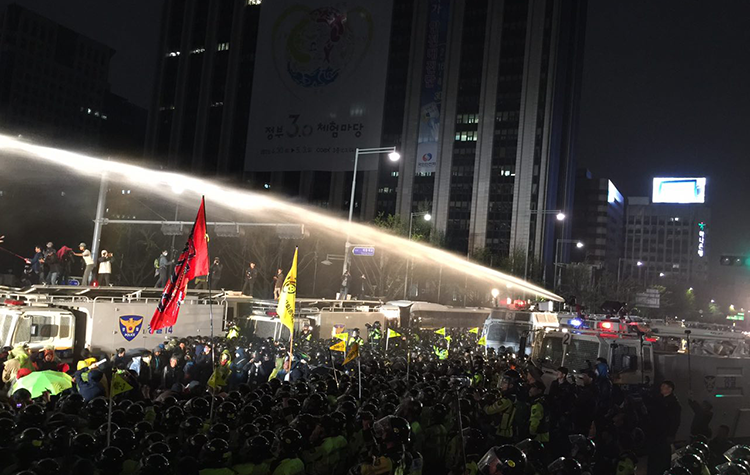People’s Solidarity for Participatory Democracy (PSPD), South Korea , a FORUM-ASIA member, strongly condemns the South Korean government’s proposed revisions to the Assembly and Demonstration Act, which include banning nighttime rallies and restricting protests for groups with a history of illegal activities. They argue that these measures violate constitutional rights and resemble the authoritarian era of the 1980s, calling for the immediate withdrawal of these unconstitutional proposals.
Read the statement down here or on PSPD website
The Government and Ruling Party Must Stop Unconstitutional Ban on Nighttime Rallies.
Total and Uniform Prohibition of Assembly at Certain Times is Unconstitutional
Following National Police Agency Commissioner General Yoon Hee-geun’s policy suggestion (May 18) to unconstitutionally regulate rallies, the government and ruling party announced this morning (May 24) that they plan to revise the Assembly and Demonstration Act to ban nighttime rallies and restrict commute-time rallies for groups with a history of illegal rallies. President Yoon Seok-yeol also supported the movement, stating he could not tolerate illegal demonstrations at yesterday’s cabinet meeting. We cannot help but be shocked by the government’s blatant attempt to push through unconstitutional legislation restricting the fundamental freedoms of assembly and association that are the foundation of democracy and to introduce a permit system for rallies and demonstrations that are prohibited by the Constitution. This is tantamount to declaring a return to the authoritarian government of the 1980s, under which any form of protest against the government was considered illegal.
The law clause that banned nighttime rallies at a specific time, which was consistent with the permit system for assembly and demonstration, was already declared unconstitutional by the Constitutional Court in September 2009. Nevertheless, the Grand National Party, the predecessor of the current People Power Party, repeatedly tried to revise unconstitutional laws at the time to ban nighttime rallies. After the prohibition clause on night assemblies, which had been in effect for 48 years since the enactment of the Assembly and Demonstration Act in 1962, was struck down by the Constitutional Court’s ruling, there have been no reported cases of night assemblies leading to social unrest or violence. At today’s party-government council meeting, however, the ruling party and government officials described the all-night sit-ins and all-night rallies by the Korean Federation of Trade Unions as attempts to cause urban chaos and manipulate public opinion. All-night rallies and sit-ins are also legitimate forms of assembly and correspond to the freedom to choose the method of assembly, which is the essential content of the right to assemble. Late-night assemblies or sit-ins may inconvenience some citizens, but these inconveniences are a constitutional duty that citizens must accept in a democratic society. To call these actions seditious because of the inconvenience shows a lack of understanding of freedom of assembly, which is a fundamental right of liberal democracy.
In addition to revising the law, the ruling party and government are pushing a plan to ban rallies organized by groups with a history of illegal rallies, implement a strict policy on rallies and demonstrations, and introduce a new clause granting police officers immunity for their duties, is a declaration of censorship, aimed at silencing voices of dissent and criticism of the current government and punishing critics through the abuse of public power. In particular, the idea of banning assemblies of groups with a history of illegal rallies at the stage of registration in the first place is nothing more than a declaration that the police, who are obliged to cooperate with the assembly, are de facto operating under a system of authorization that can reject the registration based on the content of the message or the identity of the registrant. The measure is unconstitutional because it directly contradicts the current Constitution, which prohibits a permit system for assemblies. This is similar to the idea of prohibiting election nominations for political parties with a history of illegal elections. We urge the government and the ruling party to immediately withdraw the attempt to impose an unconstitutional ban on assemblies that will close the ears and mouths of the people.



